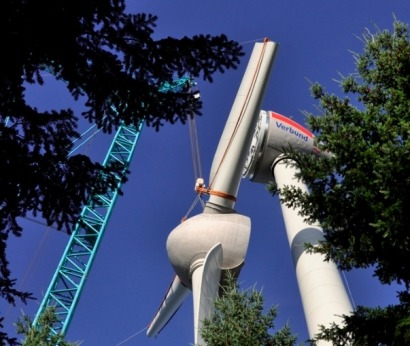
Juwi’s CEO, Matthias Willenbacher, presented his concept for the expansion of renewable energies at the Husum WindEnergy trade fair this week, bringing fresh wind into the debate about the energy transition’s speed and costs. Willenbacher’s concept could save Germany several billion euros – while the nuclear phase out and the energy turnaround could continue as planned.
"Onshore wind energy is already cheaper than energy produced in coal or gas power plants," Willenbacher said during a press conference. "We have to continue to develop good sites and use the right technology. Taller towers and larger rotors guarantee that turbines generate more than 4,000 full load hours a year, even with the same or a smaller generator output. Even offshore wind farms cannot produce significantly more."
Every kilowatt hour of wind energy produced close to the consumer and with the right technology leads to a lesser need in reserve power plants; moreover, peak voltage power grids do not have to be developed and less than half of the storage capacity is needed. This concept leads to a dramatic reduction in the energy turnaround’s cost and guarantees that electricity will be available and affordable for everyone.
But what is the German government’s reaction?
It wants to slow down the energy turnaround! A year ago, the government talked about "power gaps" and "blackouts", now the development of renewable energies has suddenly become too fast. This change of mind is justified with the supposedly too high costs for citizens.
However, the figures tell a different story: A household in West Germany has to pay around €5,000 a year for energy – about €2,000 for heating (oil or gas) and mobility (gasoline or diesel), around €1,000 for electricity; and just €120 in connection with the German Renewable Energy Law (REL). These costs are often mistakenly equated with the cost for the energy transition.
Fossil fuels getting more expensive
"Even if the REL differential costs rose to €160 or even €180 per household per year, this would still be cheaper than simply keeping on going," calculates Willenbacher. "Fossil fuels are becoming more expensive every year. This will also be reflected in the energy costs. In the area of renewable energy, however, a rapid development with innovations will guarantee that prices tumble. A wind turbine generates power at constantly low costs, for around 25 years – and it is definitely cheaper than gas or coal-fired power plants".
Offshore the most expensive way
However, there are major differences in terms of efficiency even within the area of renewable energy. "Onshore wind turbines generate by far the cheapest electricity," says Matthias Willenbacher. The costs for offshore wind farms are immense, offshore wind turbines are the most expensive way to produce energy, Willenbacher adds. In addition, thousands of miles of power lines would have to be constructed and would cost customers an estimated 20 to 30 billion euros. "Big power companies are allowed to build their wind turbines in the North Sea, although no foreseeable grid connection is available," says the CEO, shaking his head. "Once again, consumers have to pay."
What is the government’s motivation?
It cannot be the fear of losing jobs - the number of jobs associated with offshore wind farms is too small. There are many more in the solar industry, about a quarter of these jobs will probably be destroyed by the government’s decision to cut the growth rate. "People looking for the real motives behind chancellor Merkel and her cabinet’s decisions in energy policy should look at who is investing in wind farms in the North and Baltic Seas," says Willenbacher. "It is the four German major power companies that are looking for a "compensation" for the loss of nuclear power plants to get even more money from consumers - even though they already earn more than what all customers have to pay for the REL."
The cost-cutting potential of onshore wind energy compared to offshore wind power can even be greater if the existing remuneration structure is changed. Today, power from any given installation - no matter how good the site is - is compensated with a rate of 9 euro cents per kilowatt hour at the beginning. Only after a certain time – after five years according to the law - good sites are compensated with the basic five cents. "It is not clear to me why wind sites are remunerated with 9 cents per kilo watt hour for five years or longer, although they produce power for 5.6 or 7 euro cents per kilowatt hour," says Willenbacher.
Matching compensation for each location
Therefore, juwi argues for a model in which very good sites get the compensation that is necessary for it’ s efficient operation – for example, less than 5 euro cents/kWh for sites with excellent wind (about 8 meters/second in 150 meter hub height). This compensation is guaranteed over the entire period of operation. This means that the remuneration for less windy sites is higher – up to an amount that is close to today's initial compensation. If at the same time the remuneration period is extended to 25 years, thus taking into account the long operating life of the plant, enormous economic costs could be saved without slowing the rapid development of wind energy in Germany.
For additional information:

